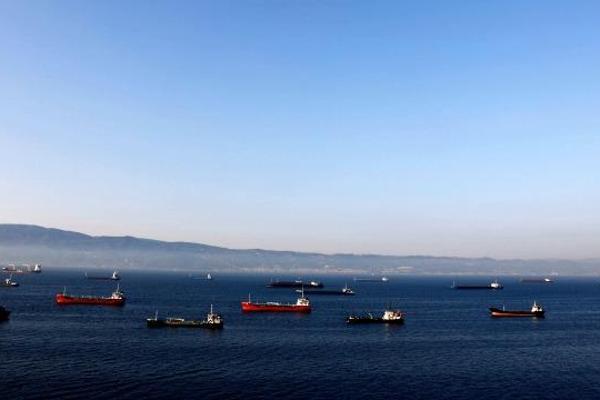Turkey eyes waiver as US sanctions on Iranian oil exports to take effect
ANKARA/WASHINGTON


Oil tankers wait to dock at Tüpraş refinery near the northwestern Turkish city of İzmit, June 28, 2017.
Turkey has expected to secure an exemption as the United States is set to reimpose sanctions on Iranian oil exports on Nov. 5.
The sanctions take effect on Nov. 5 and cover Iran’s shipping, financial and energy sectors. They are the second batch the administration has re-imposed since Trump withdrew from the landmark accord in May.
The Trump administration has carved out exemptions for eight countries that can still import oil from the Islamic Republic without penalty.
U.S. Secretary of State Mike Pompeo, who announced the U.S. decision on Nov. 2, did not name the eight, which he referred to as “jurisdictions,” a term that might include importers such as Taiwan which the United States does not regard as a country.
Having abandoned the 2015 Iran nuclear deal, U.S. President Donald Trump is trying to cripple Iran’s oil-dependent economy and force Tehran to quash not only its nuclear ambitions and its ballistic missile program but its support for militant proxies in Syria, Yemen, Lebanon and other parts of the Middle East.
On Twitter, in a message designed to emphasize his “maximum pressure” policy toward Iran, Trump included a photograph of himself modeled on an entertainment industry poster with the headline: “Sanctions are coming November 5.”
China, India, South Korea, Turkey, Italy, the United Arab Emirates and Japan have been top importers of Iran’s oil, while Taiwan occasionally buys cargoes of Iranian crude but is not a major buyer.
Turkey has been told it will temporarily be allowed to keep buying Iranian oil, its energy minister told reporters on Nov. 2.
“Just a while ago, ministry officials brought the news that the U.S. Secretary of State made a statement on limiting or lifting of sanctions for eight countries including Turkey,” Fatih Dönmez told reporters.
He said he welcomed the move, as Turkey had previously warned that the U.S. sanctions would “negatively impact the peace and economy of neighboring countries like Turkey.”
Turkey ‘recieves initial indications’
On Nov. 3, Turkish Trade Minister Ruhsar Pekcan said that Turkey has received initial indications that it will be among eight countries to be granted a waiver from U.S. sanctions against Iran, but is awaiting clarification on Nov. 5.
“Initial information coming in is that Turkey will be amongst eight exempt countries. But we don’t know for sure yet. It will be clear on Monday,” Pekcan told reporters in Ankara.
An industry source said last month that Turkey had already made efforts to cut its purchases ahead of the U.S. sanctions, but would prefer to keep up some level of Iranian oil imports.
India and South Korea were also on the list, said a source familiar with the matter who spoke on condition of anonymity. Under U.S. law, exceptions can be granted for up to 180 days.
India’s Oil Minister Dharmendra Pradhan on Nov. 3 said India and other leading oil buyers would benefit from the U.S. waiver they have been granted.
“In the current geopolitically challenging scenario, India has managed to convince international leaders,” Pradhan told reporters in New Delhi.
Oil prices fell on Nov. 2 for a weekly loss of over 6 percent, as investors worried about crude oversupply after the U.S. waivers.
The waivers will be valid for six months, during which time the importing country can buy Iranian oil but must deposit Iran’s revenue in an escrow account. Iran can spend the money but only on a narrow range of humanitarian items.
Pompeo defended the oil waivers and noted that since May, when the U.S. began to press countries to stop buying Iranian oil, Iran’s exports had dropped by more than 1 million barrels per day.
He said the Iranian economy is already reeling from the earlier sanctions, with the currency losing half its value since April and the prices of fruit, poultry, eggs and milk skyrocketing.
Reaction from EU countries
The impact remains in question as other countries, particularly Washington’s European allies, are resisting joining its effort to economically strangle the Tehran regime.
Britain, France, Germany and the European Union strongly condemned the U.S. move, as they did when Washington withdrew in May from the Iran nuclear deal, the Joint Comprehensive Plan of Action.
“The JCPOA is a key element of the global nuclear non-proliferation architecture and of multilateral diplomacy,” they said in a statement on Nov. 2.
“It is crucial for the security of Europe, the region, and the entire world. The JCPOA is working and delivering on its goal.”
Iran called on Nov. 3 for European assurances of support in the face of Washington’s intent to reimpose sanctions on vital Iranian oil sales.
Foreign Minister Mohammad Javad Zarif spoke by telephone with the EU’s foreign policy chief, Federica Mogherini, and his counterparts from Germany, Sweden and Denmark about European measures to counter the U.S. sanctions, the Iranian state news agency IRNA reported.
“Mogherini and the European ministers ... highlighted the importance of the finance ministers’ commitment to Europe’s financial mechanism to save the Iran nuclear deal and said the mechanism will be operational in the coming days,” IRNA said.
